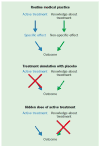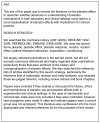Biological, clinical, and ethical advances of placebo effects
- PMID: 20171404
- PMCID: PMC2832199
- DOI: 10.1016/S0140-6736(09)61706-2
Biological, clinical, and ethical advances of placebo effects
Abstract
For many years, placebos have been defined by their inert content and their use as controls in clinical trials and treatments in clinical practice. Recent research shows that placebo effects are genuine psychobiological events attributable to the overall therapeutic context, and that these effects can be robust in both laboratory and clinical settings. There is also evidence that placebo effects can exist in clinical practice, even if no placebo is given. Further promotion and integration of laboratory and clinical research will allow advances in the ethical use of placebo mechanisms that are inherent in routine clinical care, and encourage the use of treatments that stimulate placebo effects.
Copyright 2010 Elsevier Ltd. All rights reserved.
Figures





Comment in
-
Words of wisdom. Re: Biological, clinical, and ethical advances of placebo effects.Eur Urol. 2010 Nov;58(5):792-3. doi: 10.1016/j.eururo.2010.08.018. Eur Urol. 2010. PMID: 21414856 No abstract available.
References
Publication types
MeSH terms
Substances
Grants and funding
LinkOut - more resources
Full Text Sources
Other Literature Sources
Medical

